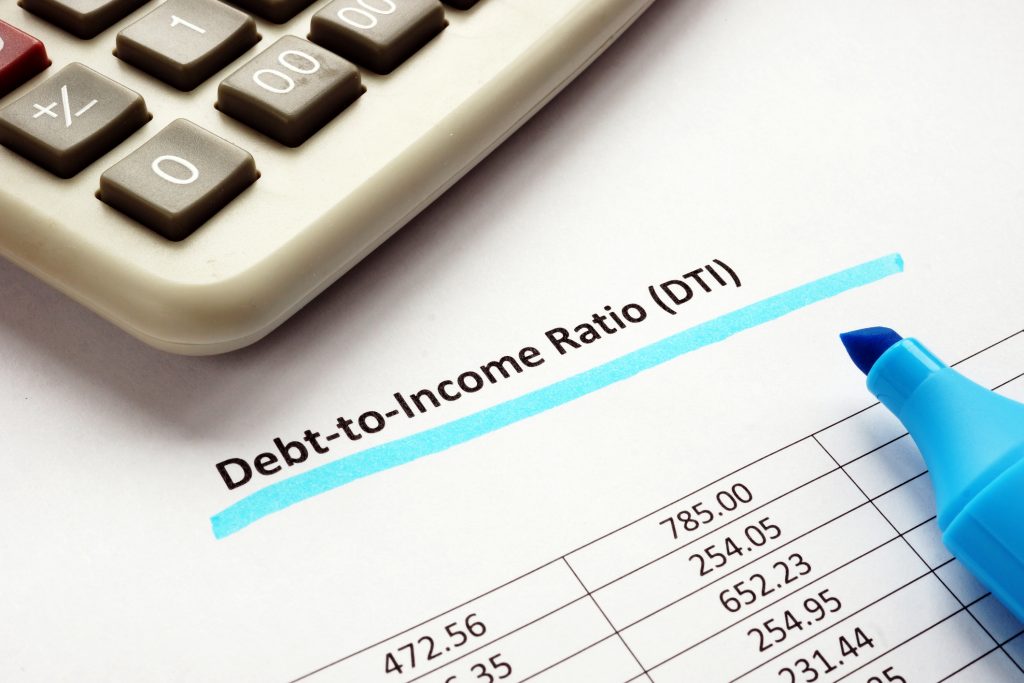What Is DTI Ratio?

Debt-to-income ratio DTI blue marker underlined.
When you calculate the percentage of your gross monthly income that goes toward paying off debt, you get your debt-to-income (DTI) ratio. Because your DTI ratio helps you qualify for mortgages and other loans, you should only factor in debt paymentsÂsuch as mortgage, car, or other loan paymentsÂwhen calculating and not regular expenses, like gas, groceries, or utility payments. You should also aim to have a low DTI ratio to qualify for new loans. Federal guidelines discuss a 36% and lower DTI as being the optimal ratio; however, if you have compensating factors such as a great credit score, it is possible to get approved with a DTI as high as 50% or more, depending on the loan program. Anything too high might disqualify you from future loans. Below are a few strategies that can help lower your DTI ratio.Â
Possible Ways To Lower Your DTIÂ Ratio
- Get ahead on debt payments. No debt means no monthly debt payments, which are part of the DTI ratio calculation. Paying off your debt takes time and discipline, so to optimize your payments, pay off smaller debts first to get the best outcome. If you pay off debts with a high payment relative to their balance, that can be best for you too.Â
- Consider refinancing large loans. This works best with loans that have longtime pay periods, such as student loans. If you reduce your minimum monthly payments to extend the life of your loan, this can reduce your DTI ratio. Remember, this time extension can mean having more interest on your loan, so keep that in mind when considering what's best for you.
- Take advantage of no interest charges with debt transfers. Credit cards often have a grace period with low to no interest rates at the beginning of their activation. If you transfer existing debt to a credit card during this window, you may be able to lower your minimum monthly payment and total amount paid over time. Before this promotional period ends, you can repeat the process to another lower interest credit card.Â
- Bring in more monthly income. The other part of the DTI ratio calculation is your gross monthly income. If you increase your income, you can lower your DTI ratio. Research ways you can earn extra cash to supplement your monthly income. A second job, side hustle, or passion project may be your answer to a lower DTI ratio.Â
- Weigh your options with a 401k loan. If you have a 401k, you can lower your DTI by taking funds out of that account to pay your debt. This allows you to repay the loan over time, often with no (or low) interest; however, you may be taxed on that loan amount. While this is a way to pay off a large amount of debt, it will impact your retirement goals. To stay on track, remember to repay your 401k.Â
Important: Before implementing any of the above items, make sure to discuss your plans with a seasoned mortgage professional. While these ideas can be helpful, they may also have unintended consequences, such as drastically lowering your credit score. A good mortgage professional will understand how such changes may affect your credit.
Get Help Finding the Right Home Loan for You
If you are looking to buy a home in Central Florida and require a home loan, the professionals at Butler Mortgage can help. For over 25 years, Butler Mortgage have assisted both first-time and seasoned buyers in finding the right mortgage solution for their needs. Call us at 407-931-3800 or fill out our free consultation form online for help.Â





